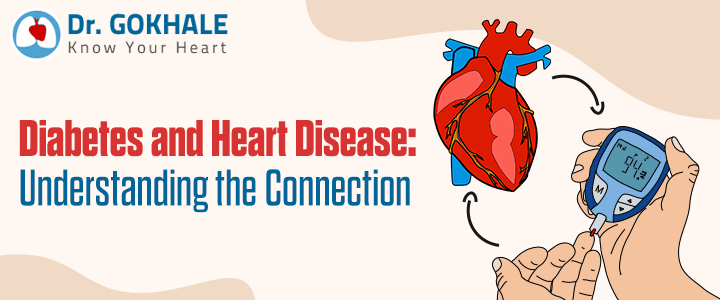Diabetes is one of the most common chronic health conditions in India today, with millions of people affected across all age groups. While it is widely recognised for its impact on blood sugar levels, fewer people are aware of the strong diabetes and heart disease connection. In fact, individuals with diabetes are more likely to develop heart problems than those without the condition.
Understanding this connection is vital for both prevention and long-term health management. With proper awareness, lifestyle adjustments, and timely care, the risks associated with diabetes-related cardiovascular disease can be significantly reduced.
Why Diabetes Affects Heart Health
To appreciate the link, it is necessary to understand how diabetes functions. Diabetes is a condition that affects the body’s ability to produce insulin or use it properly. This leads to elevated levels of glucose (sugar) in the blood. Over time, this chronic hyperglycemia can cause damage to blood vessels and nerves, which in turn affects various organs, especially the heart. The diabetes and heart disease connection is significant because the cardiovascular system is particularly vulnerable to the complications of diabetes, increasing the risk of heart attacks, strokes, and other related conditions.
Also, patients with diabetes have other risk factors that lead to heart disease, like high blood pressure, high cholesterol, and obesity. These factors put a lot of pressure on the heart and the blood vessels, leading to such conditions as heart attacks, strokes, and coronary artery disease.
Types of Heart Disease Common in Diabetics
There are several types of heart disease in diabetics, and the most prevalent one is coronary artery disease. This condition occurs when the blood vessels that deliver blood to the heart muscle narrow or are blocked by plaque.
Another risk is heart failure, which is a condition in which the heart is unable to pump blood properly. Diabetic patients are also at a higher risk of developing diabetic cardiomyopathy, a condition that affects the heart muscle regardless of hypertension or atherosclerosis. This type of damage is chronic and may not be easily detected until the heart complications become severe.
Warning Signs and Symptoms
Some of the signs of heart disease may not be easily recognisable, especially in diabetic patients. Some individuals may not get the conventional symptoms such as chest pain. However, they may experience shortness of breath, tiredness, light-headedness, or swelling of the legs and ankles. These symptoms are often overlooked as the normal signs of ageing or fatigue, and therefore, the condition is often diagnosed late.
Diabetes patients should have their heart checked often, even if they do not have any symptoms of illness. Both of these diseases can be managed effectively if detected early enough.
Prevention and Lifestyle in Managing the Risk
Diabetes-related cardiovascular disease prevention is a complex process that should involve several strategies. The first one is the proper management of blood sugar levels since this helps to prevent the damage of blood vessels and the heart.
Another factor that cannot be overlooked is the level of health and fitness of the person. This includes taking foods that are rich in fruits, vegetables, whole grains, and healthy fats, and avoiding foods that are rich in saturated fats and cholesterol. Exercise is known to prevent obesity, regulate blood flow and circulation, and maintain the health of the heart.
It is also necessary to control blood pressure and cholesterol levels by diet and exercise and with the help of medications if needed. Tobacco should not be used, and alcohol consumption should also be limited in order to reduce the risk even more. Regular check-ups, including heart tests, are important in order to detect health problems early and prevent them in the future.
Final Thoughts
It is evident that diabetes has a direct link to the health of the heart, and this is quite alarming. Diabetes patients are more prone to heart problems, and this can occur without any symptoms. Thus, by understanding this link and addressing both diseases, one can prevent the development of heart disease in diabetics and live a healthier and more active life. The best weapons against these closely related diseases are prevention, awareness, and early treatment.
 Ask Doctor
Ask Doctor
